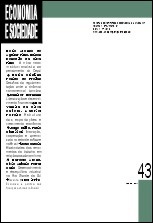Resumo
Este artigo visa analisar a posição de Marshall em relação ao capitalismo de sua época e às possibilidades de mudança social. Argumenta-se que, apesar de ser um grande defensor do sistema de liberdade econômica, Marshall considerava fundamental sanar o problema da pobreza e da indigência que assolava e degradava física, moral e intelectualmente boa parte da população. Todavia, ao contrário dos socialistas e coletivistas que visavam extinguir as principais instituições vigentes (a concorrência, a propriedade privada, o trabalho assalariado, entre outras), o autor vislumbrava uma sociedade melhor ainda sob a égide dessas instituições capitalistas. Essa situação melhor poderia ser atingida por meio da intervenção do Estado e de mudanças importantes nos valores dos indivíduos – que envolveriam a adoção de uma postura mais nobre e cavalheiresca no seu agir econômico.
Abstract
This paper analyses Marshall‟s view in relation to capitalism and to the possibilities of social change. It is argued that in spite of being an important defender of the system of economic liberty, Marshall thought it was crucial to solve the problems of poverty and indigence that degraded physically, morally and intellectually a great part of the population. He rejected the socialists and collectivists solutions – that aimed at extinguishing the main prevailing institutions, such as competition in the market and private property, and wage-labor; and defended that a better society could be built preserving the key institutions of capitalism. He believed that this better situation could be achieved by prompt intervention of the State, and by important changes in the values of the individuals of society, that involved more nobility and chivalry in their economic action.
Keywords: Alfred Marshall. Capitalist. Poverty. Socialism. Social change
Referências
BIAGINI, E. New liberalism. In: RAFFAELLI, Tiziano; BECATTINI, Giacomo; DARDI, Marco (Ed.). The Elgar Companion to Alfred Marshall. Cheltenham, UK: Edward Elgar, 2006.
CALDARI, K. Alfred Marshall‟s idea of progress and sustainable development. Journal of the History of Economic Thought, v. 26 n. 4, p. 519-536, 2004.
COATS, A. W. Marshall and ethics. In: McWILLIAMS TULLBERG, R. (Ed.). Alfred Marshall in retrospect. Vermont: Edward Elgar, 1990.
COLLINI, S. et al. That noble science of politics: a study in nineteenth-century intellectual history. Cambridge: Cambridge University Press, 1983.
GERBIER, B. Economic Chivalry. In: RAFFAELLI, Tiziano; BECATTINI, Giacomo; DARDI, Marco (Ed.). The Elgar Companion to Alfred Marshall. Cheltenham, UK: Edward Elgar, 2006.
GROENEWEGEN, P. A soaring eagle: Alfred Marshall 1842-1924. Aldershot: Edward Elgar, 1995.
KEYNES, J. M. [1925]. Alfred Marshall, 1842-1924. In: PIGOU, A. C. (Ed.). Memorials of Alfred Marshall. New York: Augustus M. Kelley, 1966.
KEYNES, J. M. [1926]. O fim do laissez-faire” em John Maynard Keynes: Economia. Organização Tamás Szmerecsanyi. São Paulo: Editora Ática, 1984.
MALONEY, J. Marshall and business. In: McWILLIAMS TULLBERG, R. (Ed.). Alfred Marshall in retrospect. Vermont: Edward Elgar, 1990.
MARSHALL, A. [1873]. The future of the working classes. In: PIGOU, A. C. (Ed.). Memorials of Alfred Marshall. New York: Augustus M. Kelley, 1966.
________ [1885]. The present position of Economics. In: PIGOU, A. C. (Ed.). Memorials of Alfred Marshall. New York: Augustus M. Kelley, 1966.
MARSHALL, A. [1890]. Some aspects of competition. In: PIGOU, A. C. (Ed.). Memorials of Alfred Marshall. New York: Augustus M. Kelley, 1966.
MARSHALL, A. [1907]. The social possibilities of economic chilvary. In: PIGOU, A. C. (Ed.). Memorials of Alfred Marshall. New York: Augustus M. Kelley, 1966.
MARSHALL, A. [1920]. Principles of economics. Pennsylvania: Porcupine Press, 1982.
PARSONS, T. Wants and activities in Marshall. Quarterly Journal of Economics, n. 46, 1931a.
PARSONS, T. Economics and sociology: Marshall in relation to the thought of his time. Quarterly Journal of Economics, n. 46, p. 316-347, 1931b.
PESCIARELLI, E. Entrepreneurship and profits. In: RAFFAELLI, Tiziano; BECATTINI, Giacomo; DARDI, Marco (Ed.). The Elgar Companion to Alfred Marshall. Cheltenham, UK: Edward Elgar, 2006.
RAFFAELLI, T. Character and capabilities. In: RAFFAELLI, Tiziano; BECATTINI, Giacomo; DARDI, Marco (Ed.). The Elgar Companion to Alfred Marshall. Cheltenham, UK: Edward Elgar, 2006.
REISMAN, D. Alfred Marshall: progress and politics. Macmillan Press, 1987.
REISMAN, D. Alfred Marshall’s mission. MacMillan Press, 1990.
ROBINSON, J. Marx, Marshall and Keynes – Three views of capitalism. In: ________. Collected Economic Papers of Joan Robinson. Oxford: Basil Backwell, 1964. v. 2.
SCHUMPETER, J. A. Alfred Marshall‟s principles: a semi-centennial appraisal. The American Economic Review, v. 31, n. 2, p. 236-248, 1941.
SHOVE, G. F. The place of Marshall‟s principles in the development of economic theory. The Economic Journal, v. 52, n. 208, p. 294-329, 1942.
TULLBERG, R. Socialism. RAFFAELLI, Tiziano; BECATTINI, Giacomo; DARDI, Marco (Ed.). The Elgar Companion to Alfred Marshall. Cheltenham, UK: Edward Elgar, 2006.
VINER, J. Marshall‟s economics in relation to the man and to his times. The American Economic Review, v. 31, n. 2, 1941.
WHITAKER, J. K. Some neglected aspects of Alfred Marshall‟s economic and social thought. History of Political Economy (HOPE), v. 9, n. 2, 1977.
A Economia e Sociedade utiliza a licença do Creative Commons (CC), preservando assim, a integridade dos artigos em ambiente de acesso aberto.

